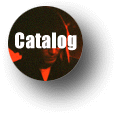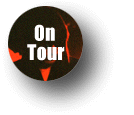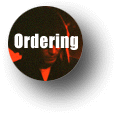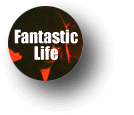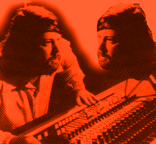

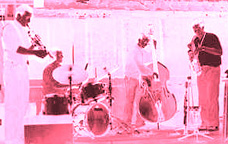
The Gold Sparkle Band
Fugues and Flowers CD
(look further down for Nu*Soul Zodiac Reviews)
|
The Wire September 2002 "The Gold Sparkle Band's second release captures the Brooklyn-based free jazz quartet live at several stops on their 2000 Midwestern tour. With a huge, exuberant sound that belies their small size, they fuse elements of early Ornette Coleman, the mid-60's ESP crowd (esp. Albert Ayler), the AACM in their heyday, and the contemporary downtown avant scene, which they enter via alto saxophonist and main composer Charles Waters and trumpeter Roger Ruzow's membership of William Parker's group. Intentionally or not, the unvarnished and somewhat boomy two-channel recording might just as have been made in 1964 as today. But the playing is of the highest calibre. Waters squeezes out seamless, arhythmic lines that recall Ornette Coleman's legendary plastic instrument. Tireless drummer Andrew Barker attacks his kit with tastefully measured ferocity - especially on "Zodiac Attack", where he's intent on hitting everything insight while keeping up a double-time pulse throughout a relentless solo clocking in at nearly four minutes. Part composition and part 'comprovisation', GSB's arranged, often highly lyrical passages set up semi-improvised sections for the inevitable head to heads between Waters and Ruzow. Waters' four compositions are all adaptations of the fugue form, though fans of Baroque music might have trouble recognizing them as such underneath the periodic blowouts, klezmer-like moments (with Waters switching to clarinet), blaring faux military statements (shades of Albert Ayler), and Ruzow's joyfully sputtering animal sounds. The quartet are at their best when they throw caution to the wind, as on the rollicking collective composition "Zodiac Attack". But their beautifully restrained interpretation of the slow William Parker number "Holiday For Flowers" reveals a more expressive and delicate side."-Dave Mandl Aquarius Records Reviews "Contemporary improvised 'free' jazz from this young-ish group. Recorded live in various venues throughout the Midwest, the Gold Sparkle band take the wildest sounds of NY's downtown scene and imbue them with Ayler-ish free-bop glee. Reminds me of Sixties ESP jazz mixed with some of today's mainstays, David S. Ware, Tim Berne, John Zorn, Spy Vs. Spy. The first track is a killer, sputtering stuttering squealing structureless mayhem. Drums way up in the mix, melodies batted wildly back and forth. Nice. Once in a while the bottom seems to drop out, but they recover deftly and quickly. The record winds up with the almost half hour final track, a gorgeous funereal free jazz dirge, that builds and builds into a pounding orgiastic tribal workout. Pretty cool." Pitchfork, November 4, 2002 "The Gold Sparkle Band originally hails from Atlanta, and relocated (for the most part) to New York at the end of the last century. By the sound of Fugues & Flowers, though, they're pure Ft Worth, Texas. That is, their Southern roots shine most obviously in the band's similarity to Texan Ornette Coleman's early 60s quartet with Don Cherry, Billy Higgins and Charlie Haden. And instrumentation isn't the only common trait the two bands share-- a freewheeling mixture of haphazard heads, breakneck group interplay, and occasional lapses into inner-space are major bullet points for both. It's a relief that these guys weren't satisfied with the superficial bonds, though, because they go even further into homage by playing music that is never less than viscerally engaging (even when they lead us on wild goose chases). Another notable connection for the Gold Sparkle Band is bassist William Parker, with whom sax/clarinetist Charles Waters, trumpeter Roger Ruzow and amazing drummer Andrew Barker have performed. This is an important connection because like Parker, this group forgoes the typically eclectic New York City avant-garde sound for a more traditionally "free" jazz style. This is not to say they play straight-ahead (and their raucous, epic pieces are as boisterous as any experimental klezmer band you'd care to name), but they're firmly part of a lineage including Coleman, Albert Ayler, Cecil Taylor and their heirs. Fugues & Flowers, the band's fourth release, documents several shows from late 2000. The opener "Zodiac Attack" is the most rhythmically straightforward on the album, as Barker and bassist Adam Roberts lay down a deft Latin-influenced groove over which the horns offer a typically flighty Ornette tribute (and come dangerously close to sounding like fellow Coleman admirers, John Zorn's Masada). It doesn't take long for the fireworks to start, as Waters' solo begins restless but restrained, and explodes into skronk-fury. After a brief solo entrance by Ruzow, both horns join in with Barker for more hi-energy interaction. The Gold Sparkle Band are most often at their best when they drop the solo/head/solo structure and simply all dive in at once. The last solo here belongs to Barker, and even those of you that hate the idea of a long drum solo should dig this one. (He's a monster and then some.) "Motor City Fugue" begins with a somber trumpet/clarinet exposition, but the bottom falls out soon enough. Of course, the idea of a jazz fugue isn't new; this group's subjects, answers and various interweaving lines, however, usually seem closer to vaguely related ideas than formally connected passages. As extended group improvisation goes, the band has a knack for keeping brainstorms in the ballpark of outsider comprehension. Waters' clarinet soliloquy about five minutes in is reason enough to stay alert, but Barker's return near the end (amazingly, his strokes suffered no ill-effects after twenty minutes playing behind the band) is as much a feat of endurance as it is musical statement. So, the Gold Sparkle Band's next move should be interesting: do they continue refining the sound of still vibrant post-ESP jazz, or declare intentions fully their own? Moments here suggest that the latter isn't out of the question." -Dominique Leone In a review which also discusses the Fully Celebrated Orchestra's Marriage of Heaven and Earth album: "This unprejudiced audience FOC attracts often comes from college radio and the uncommitted indie-rock crowd to which Gold Sparkle Band (GSB) also appeals. A tale of two cities, trumpeter Roger Ruzow continues to reside in Atlanta, the band's initial home base, while reedman Charlie Waters, bassist Adam Roberts and percussionist Andrew Barker now make Brooklyn their home. While Waters and Barker have become part of bassist William Parker's Little Huey Creative Music Orchestra among other Big Apple aggregations, the quartet still isn't really a New York band as this CD shows. Lengthy "Motor City Fugue," for instance, was recorded in Atlanta, while the rest of the tunes were recorded in Chicago. Paradoxically, GSB seems both more traditional and more outside than FOC. Some of the heads the band plays -- all but two written by Waters -- resemble Jazz Messenger themes, while some of the solos -- again mostly by the reedman -- seem to take as much from the modern, European, so-called classical tradition as jazz. It's this tradition which is most apparent in his clarinet playing. On alto, Waters' vernacular, like that of Hobbs comes mostly from Coleman, with some Eric Dolphy thrown in for good measure. Even more noteworthy, though, is the playing of trumpeter Ruzow, potentially the most interesting brass stylist to come from Georgia since trombonist J.C. Higginbotham in the 1930s. Trained as a bassist, Ruzow only began playing trumpet professionally with the formation of GSB in 1995. Perhaps it's this novelty which still enlivens his solos. Certainly his admixture of melodic, open horn forays, muted asides and a repertoire of squeezed out smeary tones, flutter tonguing and whistles creates a unique niche. These qualities are put to particular use on "Second City Fugue (Subject)," where his mid-register double-timing suggest Klezmer music -- or perhaps trumpeter Ziggy Elman, who had traces of that style in his trumpet work with Benny Goodman. Unison sounds come from a combination with Waters' alto, though the duck quacks heard seem to arise from the clarinet reed. Waters also seems to unveil snake-charmer's flute on "Second City Fugue (Counter-Subject)," which when mated with Roberts' quick walking bass suggests Charles Mingus' 1960 quartet with Dolphy and Ted Curson as much as Coleman's "Focus On Sanity." All techniques are rolled together on the almost 25 1/2 minute "Motor City Fugue." At different times, the band members split into trios, duos (trumpet-drums and clarinet-bass) and even go solo, with Barker finally able to bang different parts of his kit and Roberts given a little more arco leeway and room for some string strumming. At one point the saxist introduces reed-biting foghorn squalls from his alto, at another exhibits sweet, almost-traditional New Orleans-style clarinet, while the rest of the group lays out. Not to be outdone, Ruzow exhibits a panoply of effects himself that range from burnished muted lines to military brass band flourishes and rollicking spit tones. Both FCB and GSB give you new faith in modern improvised music's consistent rejuvenation. Plus each of the eight musicians involved is young enough to get even better in writing and playing. There may be a time, in fact, that singly or together FCB or GSB may be synonymous with A-1."-Ken Waxman "Altoist Charles Waters and trumpeter Roger Ruzow meld be-bop virtuosity with the out-there-ness of free jazz. They flail at the coalface of Dadaist sensibility, finishing their phrases with atonal screeches and little brap brap noises. Good job the drummer's solid. These recordings of live, improvised gigs come with sleeve notes that try very hard to link the band to Detroit. For me, this is New York, loft, late Sixties/early Seventies-Coltrane, Ayler, Shepp-or maybe Africa and Europe, same times (The Brotherhood of Breath, Sun Ra). You know where you stand with this stuff; on the ledge of the Empire State Building in a force 10 gale."-Steve Hanson Creative Loafing Atlanta 6/26/02 "It's unfair to call the Gold Sparkle Band "youngsters" anymore. Everyone in the quartet has hit 30 -- or near to it -- and the band itself has been around for nearly a decade. Reflecting this maturity, GSB's fourth album, Fugues & Flowers, is its best to date. Most of the band has relocated from Atlanta to New York City. And with bassist Adam Roberts now firmly ensconced in the rhythm section, GSB's rhythms are less obvious. Recorded during various live dates, the playing on Fugues & Flowers is the group's loosest and most mature yet. Technique and influences are no longer trotted out to prove the music's worth. Instead, we get a comfortable interplay in which the players listen to one another rather than shout each other down. Unlike past efforts, reedist Charles Waters handled the lion's share of the writing this time, and he's come up with a memorable collection of tunes (the album also includes a well-chosen cover of William Parker's "Holiday For Flowers"). As the title suggests, the group uses fugues; Waters' themes are stated and reiterated in a way that nicely highlights individual perspective and group unity. Smooth, bright-sounding and tasteful, local boy Roger Ruzow's horn is a nice counterpoint to the porous tone of Waters' alto saxophone. Sonics aside, the pair's chemistry has evolved to the point where each is capable of finishing the other's thoughts while still offering fresh perspective. They've grown up. Some have even left home. But don't call the Gold Sparkle Band prodigal sons. Fugues & Flowers proves they've found their way in the world."-Tad Hendrickson Where Y'At July 6, 2002 "Formerly of Atlanta, now (mostly) residents of Williamsburg, Brooklyn, the Gold Sparkle Band continue to go from strength to strength as they develop into one of the tightest and most exciting bands in creative music. That's right, a band, not a trio/quartet/sextet of bandleader + sidemen, as is the working model in most of the jazz world. The use of the word 'band' in their name is telling. Where many of their contemporaries in both the straight-ahead and freer jazz realms usually strive to attain individual name recognition, the Gold Sparkle Band have honed their skills as an ensemble with vision, compositional scope (yes, tunes!), and deep musical interaction that eludes many well-known instrumentalists who fall prey to the all-star syndrome. This current release combines concert and radio recordings from gigs in Chicago and GSB hometown Atlanta that show their range and power as improvisers within a compositional framework that strengthens the liberated free-play. The horn frontline of Charles Water (alto sax, clarinets) and Roger Ruzow (trumpet) has logged time in the Krewe du Jew marching club in New Orleans’ Krewe du Vieux parade and it shows in their jubilantly vocal unison lines and authoritative solos. Ruzow has a wonderfully dirty tone on trumpet that alternately brings to mind Cootie Williams and Lester Bowie. Waters’ darting alto sax and clarinet work mixes hyper-kinetic Dolphy-isms with roaring overtones that ignite the faster passages. The superb rhythm section, Adam Roberts on bass (huge, Mingus-like sound) and the terrific Andrew Barker on drums, achieves telekinesis whether swinging with abandon or providing coloristic accompaniment. Individual highlights are many: the lovely rendition of GSB mentor William Parker's 'Holiday for Flowers,' the bass and jaw's harp (by Barker) coda that closes 'Second City Fugue (Subject),' and the extended sprawl of 'Motor City Fugue.' But really this record works as a whole, much like GSB's devotion to the band concept. Gold Sparkle are not content to merely imitate their heroes from the 60's: this is a band with its own story to tell."-Rob Cambre "Charging out of the gate with the ten and a half minute 'Zodiac Attack'; which feels like a collision between Albert Ayler and Ornette Coleman while they try to wrestle some wild kind of New Orleans funeral march into submission. Charles Waters' sax blazes and yodels in spastic ecstatic cries and yelps, drummer Andrew Barker bounces and ricochets like a Superball with an uncanny sense of rhythm(s) thrown hard down a long hallway, trumpet player Roger Ruzow duets and contrasts Waters' sax with uncanny empathy, while double bass player Adam Roberts holds down the rhythmic fort. On the fifteen and a half minute second track; 'Second City Fugue (Subject)' Bassist Roberts emerges from a droning shimmering haze with nimble dancing bowed and plucked notes, the trumpet talks in whimsical drunken questions, while the sax circles the scene like a quizzical hornet, and the drums thrum and clatter in feathery gentled subtle ways; all of which makes for an oddly dreamy quarter of an hour. Their version of William Parker's 'Holiday for Flowers' is a lyrical subdued five minutes and forty eight seconds, that feels like a woozy beautiful melodic daydream; and shows what a masterfully understated outfit they can be. Recorded at various live dates throughout their 2000 tour of the Midwest; the sound is exquisite on all six tracks. By looking backwards and forwards at the same time; this Atlanta Georgia band help to reinvent and renew what jazz is; can be, and is becoming."-George Parsons AllAboutJazz.com October 2002 "Andrew Barker's drums vie with the J train passing mere feet from my window. As the sounds of the last elevated car fade away, the percussion crescendos in victory. With music recorded live in Chicago and Atlanta during a 2000 tour, album art showcasing the Sears Tower, and references to Detroit in the liner notes, the Gold Sparkle Band is embracing a cosmopolitan vibe on their fourth album Fugues & Flowers. The first track "Zodiac Attack" opens with a James Brown-style blast. Charles Waters (alto saxophone, clarinets) and Roger Ruzow (trumpet) throw out a few quick punches on horns. Free form takes over for a while and the rhythm section (Barker, and Adam Roberts on double bass) goes nuts. Seven minutes into the tune Barker gets wild on his set for an extended solo. The quartet restate the theme, and they end with a long, twisted brassy note. Definitely not for a lazy Sunday morning, but for the moonlit hours, with the tail-lights of a 747 moving steadily across the black sky, are perfect times for the Gold Sparkle Band. Next track: "Second City Fugue". Somebody's making vibrations that sound like a helicopter propeller. It's the opening seconds of a 25 minute, 31 second song that's broken up into three parts and you wonder what's going to happen. The music gets very experimental. Those power-funk blasts from the first track are a distant memory, and now Ruzow is making weird sounds with his trumpet. But soon Barker comes back in with his comforting fibrous percussion and you know everything's going to be alright. Unfortunately, the composition is technically not a fugue, as the title would suggest. And one might question the motive of a band who embraces boundless freedom in its playing, yet names a song after an exquisitely precise compositional form. The group tributes bassist William Parker with a careful rendition of "Holiday For Flowers". Waters plays a slow lament on clarinet. Throughout the disc, the contrast of horns makes Waters' sax sound elegant, and Ruzow's trumpet sound crass. It's the kind of crass that draws out the human essence. It makes you realize that there's a whole spectrum here. That it's not all about sounding pretty or interesting, or having fancy names. It's about culling up what lies within."-Celeste Sunderland "Fugues and Flowers is another fine outing from Brooklyn¹s Gold Sparkle Band, who belong in an outstanding class of jazz artists like Ellery Eskelin, William Parker and the Vandermark 5. What unifies them is not only a deep familiarity with free jazz and a willingness to play it, but also a viewpoint that dissonance and free rhythms are simply two of many possible options. They all possess the ability to not only move effortlessly between composed and improvised sections, but also to play in many different styles and change direction smoothly. Style changes are indeed the order of the day on Fugues and Flowers, which is also similar to a Vandermark 5 record in the sense that the Gold Sparkle Band seem to relish making every track vastly different from the one that preceded it. For example, drummer Andrew Barker begins ³Zodiac Attack² with a busy, propulsive vamp, over which alto saxophonist Charles Waters sprays free, visceral, Daniel Carter-like lines. Then comes the plodding, space-filled ³Second City Fugue (Subject),² which feels almost silent in comparison, until the piece settles into a quasi-Arabic groove eleven minutes after it begins. Similarly, the quartet¹s lovely cover of Parker¹s ³Holiday for Flowers² is slowly swinging and rather harmonically and rhythmically conventional. But the piece that follows it, ³Motor City Fugue,² takes its time building up to a multidirectional free frenzy - with Waters, Barker, bassist Adam Roberts and trumpeter Roger Ruzow all at full tilt - before adding an encore rendition of ³Zodiac Attack.² Fugues and Flowers also feels like a grab bag in addition to the frequent style changes, the album was recorded at several different locations and the sound quality varies from track to track. For example, Roberts is almost inaudible on the first performance of ³Zodiac Attack.² And despite the fact that five of the six pieces here have the words ³fugue² or ³flowers² in their titles, there¹s no obvious conceptual or musical thread to tie them together. Fugues and Flowers is best viewed, then, as a sampler of the many things the Gold Sparkle Band does well, and on that account, the many Vandermark 5 fans who aren¹t familiar with the Gold Sparkle Band should find Fugues and Flowers more than worth their time. But those looking for a more cohesive, better-recorded document might first want to check out the Gold Sparkle Band¹s superb 2000 album, Nu*Soul Zodiac."-Charlie Wilmoth Ink 19 September, 2002 "Endowed with a cleverly nostalgic and classy title, Fugues And Flowers shows the nearly eight-year old collaboration between Charles Waters, Roger Ruzow, Andrew Barker, and Adam Roberts in a tender light. Comprised of live recordings culled from a tour to support the preceding Gold Sparkle Band release, Nu*Soul Zodiac, Fugues is a achingly spirited release. As any music reviewer or bespectacled, vinyl-fetishist, author of Saxophones and Beards: An In-Depth History of Avant-Garde Jazz Music, kind-of fan will tell you, this is, strangely enough, free jazz music with an acute sense of historical reference. For instance, the opening track, "Zodiac Attack," begins with a drum beat easily echoing Billy Higgins' playing on Ornette Coleman's The Shape of Jazz to Come, if that helps to make the picture a bit clearer. The Gold Sparkle Band seems to reference the work of Ornette Coleman and Eric Dolphy almost religiously, shirking the weight of "outness" embraced by Coleman only a few years after his most tuneful phase and heralded by Germans, Brits, and Sun Ra. Somehow, in the shuffle of time, free jazz came to denote something very, very chaotic, and those masses of atonal, arrhythmic kineticism started to obscure those sweet, skewed harmonies and impulsive(!) melodies that I fell in love with when I just started to discover free jazz. All of the indulgence of The Gold Sparkle Band's nostalgia is tempered by the fact that they are keeping an important folk tradition alive. When Coleman and Dolphy started to usher in those ideas of freedom, it was a fresh tradition, there is no delusion about "furthering jazz" on Fugues And Flowers. The amount of energy, subtlety, and -- amazingly enough -- accessibility certainly compensate for any sense of retread."-Matthew Aurealis Magnet #57, January 2003 "The Gold Sparkle Band's sprawling Fugues and Flowers is another note from the road. Reed player Charles Waters, drummer Andrew Barker and bassist Adam Roberts live in New York now, but when they toured the Midwest in 2000 to support their last album (the punkily pithy Nu*Soul Zodiac), they coaxed their old trumpeter Roger Ruzow away from his day job teaching music to Atlanta public-school students. I can hear why; he and Waters have the sort of rare chemistry that can only be found and nutured, not manufactured. Both are eager and aggressive players, but on the three-part epic "Second City Fugue", Ruzow's earthy emotionalism and textual imagination emit sparks that light a fire beneath Waters' more cerebral and historically concious explorations."-Bill Meyer "Another cool CD in a series of very cool CDs from a very cool band. Following in the tradition of Ornette Coleman, this horn-heavy quartet screams scattered lullabies and lectures that skitter seamlessly from one track to another as though this is one great, long jam-session propelled by incredible amounts of energy and inhuman lung stamina. Charles Waters is the demon behind the clarinet and sax, and man, does he blow! In a good way! While the other players are excellent, too (Roger Ruzow on trumpet, Andrew Barker on drums, and Adam Roberts on double bass), it's obvious from the construction of these pieces that if there was a lead singer on this record, it'd be that crazy horn man and his crazy horns."-Holly Day |
Nu*Soul Zodiac Reviews
|
Village Voice March 16, 2001 "The four members of Gold Sparkle Band‹altoist-clarinetist Charles Waters, trumpeter Roger V. Ruzow, bassist Adam Roberts, and drummer Andrew D. Barker‹also know their Coltrane and their Ayler and Hill and Shepp and Zorn. And all those avant shadows tend to mitigate the overwhelming influence of Ornette Coleman, giving the ensemble a sound of its own, with centered pitch and buoyant rhythms (they know Eddie Blackwell, too) and a touch of klezmer. Only five of 11 selections are over four minutes, and all the pieces are focused, some to produce a single effect‹the kinetic drum riff of "Double Bump," the planned chaos of "Splintered Synapse"‹while others are rendered dirgelike with arco bass and the addition of cellist Kim Lemonde. Ruzow growls and whinnies, but has a fat broad sound when he wants, and the musicianship is high all around."-Gary Giddins Creative Loafing Atlanta 4/29/00 [Feature Article] "In the alterna-pop world of college radio, it would seem unlikely
that semilocal free jazz outfit Gold Sparkle Band would find an
ally. But that's exactly what happened: College radio opened up
its arms and welcomed them in a big way. Since 1995, the Gold
Sparkle Band have been heard all over Atlanta on college stations
WREK and WRAS, and more recently all over the country: New York,
Philadelphia, Chicago, San Francisco and beyond. Jazziz 2000 "The latest release from the Gold Sparkle Band threatens to become a leaden handcuff around the innovative wrists of Ornette Coleman, who once remarked: 'My playing is spontaneous, not a style. A style happens when your phrasing hardens.' Reedplayer Charles Waters, trumpeter Roger V. Ruzow, bassist Adam Roberts, and drummer Andrew D. Barker seem to harden the sound of Coleman's classic free jazz. They verge on becoming something paradoxical: a repertory band for avant-garde music. But through a combination of tactful musical navigation and outright burning intensity, they produce fresh, vital possibilities using the formulas of post-bop's original breakthroughs. Originally from Atlanta, now based in New York (save Ruzow), the members of the Gold Sparkle Band search for inspiration in the established liberation of vintage free jazz. Waters calls down Coltrane's sheets of sound on "Nu Millennium Waltz"; Ruzow explores the somber reticence of certain A.A.C.M. pieces in his composition "Promises of Democracy"; Barker's drumming drives the quartet to new heights - especially in his interplay with Waters - and summons by turns the majestic pulse of Elvin Jones and the frittering energy of Sonny Murray. But as they hover in the alchemist's study of canonized post-bop, poking around among the sacred texts, ancient instruments, and cabinets of wonder, the Gold Sparkle Band's music begins to roil and transmute. Their own voices emerge - Waters' leaderly insouciance, Ruzow's darting interjections, Roberts' hard, precise swing, Barker's ebullient percussive commentary. The old equations of free jazz become vehicles for the group's own spontaneity."- Michael Kramer The Wire April 2000 "Recorded in Atlanta, Georgia, this is the third album from the Gold Sparkle Band. The quartet's innocuous name masks some serious playing by remarkably assured musicians. Whether elaborating a meditative theme or blowing freely from some Coleman-like head, trumpeter Roger Ruzow and reedist Charles Waters are unequivocal: they favour a big sound and bold articulation. The rhythm section-Andrew Barker on drums and Adam Roberts on bass-is appropriately vigorous".-Julian Cowley Chicago Reader Saturday April 22, 2000 "The Gold Sparkle Band's name says flash, but its high-spirited music delivers substance. The quartet's compositions are steeped in a half century of jazz history; the sprawling 'Fellowship,' on their latest CD, Nu*Soul Zodiac, is dedicated to Other Dimensions in Music; on the 1997 Downsizing, the melodies of 'Lamentations (for America)' sound like Mingus, and 'Posledni Autobus Z Bratislavy' is tinged with klezmer. Clarinetist and saxist Charles Waters, drummer Andrew Barker, trumpeter Roger Ruzow, and bassist Adam Roberts can make long, episodic suites hang together with aplomb-on 'Fellowship' Ruzow and Waters' tightly braided double solos flow into grave and gorgeous unison passages, and on the mournful 'Promises of Democracy' the band negotiates a complex series of timbral shifts with the delicacy of a chamber ensemble. But they're even more impressive when they want to be succinct. On 'Carousel Lost' they articulate an Ornette-ish opening theme, upend it with a barrage of dizzying solos, and close by reprising it, all in under three minutes; they rip through the blowout 'Splintered Synapse' in less than two. Waters and Barker now live in New York, where they also play in William Parker's Little Huey Creative Music Orchestra, but Ruzow hasn't left the group's first home in Atlanta, so it's not easy for this band to get together; this may be its only area performance in the foreseeable future."-Bill Meyer All Music Guide Web Four stars**** CMJ New Music Report, Issue: 654 - Feb 21, 2000 "This young quartet of free-thinking improvisers captures the same mood and feel as the original Ornette Coleman quartet, improvising with an intensity that burns like a fiercely simmering blue flame. While not quite on the same level as the aforementioned icons, this young group continues to show promise that bodes well for its future."-James Lien Exclaim! "This quartet will delight anyone who admires the energy and adventurous scope of bands like the Art Ensemble of Chicago or the Vandermark Quartet. Their spirit recalls the way that the energy music of the '60s was channeled into fresh directions in the '70s by players like Oliver Lake. Guest Kim Lemonde's cello adds crucial gravity to 'The Aleph' and 'Splintered Synapse', while the brooding 'Motor City Fugue' features the bass clarinet of composer Charles Waters. Yet it's the band's ability to generate a compelling sense of swing in tight riff-driven numbers like 'Nu Millenium Waltz' and 'Borges' that confirms the excitement that Gold Sparkle Band generates with such impressive consistency".-David Lewis Creative Loafing Atlanta March 1, 2000 "Whether free jazz can be taken in any new directions remains
debatable. After all, adding to a musical vocabulary that was
thoroughly explored by giants like Coltrane, Coleman, Dolphy and
Sanders (to name but a few) seems a rather pointless pursuit.
Still, that fact has not deterred nouveau jazz ensemble the Gold
Sparkle Band from trying. And good for them, because their new
album Nu*Soul Zodiac offers compelling evidence that there's
still life in the old boy. Downtown Music Gallery Newsletter #42 "Gold Sparkle are Charles Waters on alto sax & clarinet, Roger Ruzow on trumpet, Adam Roberts on bass & Andrew Barker on drums, with guest cellist Kim Lemonde. Since moving to NY from Atlanta a couple of years back, Gold Sparkle co-leaders Charles & Andrew have kept quite busy - they are both members of William Parker's Little Huey Orchestra and Charles put out a fine solo clarinet CD and is a member of a Brooklyn based chamber ensemble. They have played a few outstanding gigs with Other Dimensions in Music and this is their third fabulous release - they just keep getting better. You can tell that these guys have worked long and hard on their thing, since they are often burning, tight and ever pushing the envelope. Their opener - "Nu Millennium Waltz" has that early Ornette Quartet throbbing bass and fresh sound. Charles switches between alto sax & clarinet, spinning notes with the trumpet in tight webs and Andrew plays that wonderful loose/tight thang that Ed Blackwell once excelled at. "Other Anthem" is a marvel from the opening tight flurry of notes and once more Ornette's 'Free Jazz' seems like a starting point for this great piece. "Motor City Fugue" shows the group's quiet resolve, the clarinet & trumpet weaving notes around the bowed bass & mallets. "The Aleph" is another droning anthem where the horns & cello spiral in circles building to controlled frenzy. Charles blasts his alto into the furthest reaches of freedom on "Fellowship" so watch out! Andrew's rhythmic stomp on "Double Bump" is an amazing exercise in propulsion - pumping the spirits into hyper-drive and the GSB completely go wild on the short but intense "Splintered Synapse". Andrew's stomping rhythmic prowess also fuels "Soul Zodiac", which continually changes section to section. All four members of the Gold Sparkle Quartet are at their heights throughout, their compositions concise, diverse and exhilarating!" Magnet No. 45 June/July 2000 "All that glitters isn't old gold. Behold the Gold Sparkle Band, an Atlanta quartet whose saxophonist, Charles Waters, is also active in New York's Lower East Side scene. Nu*Soul Zodiac bursts with barely corked energy and speaks a post-bop language learned from Cherry, Coleman and Charles Mingus. The band makes this tongue its own by applying some of it to catchy, aggressive tunes; someone here has a punk-rock past."-Bill Meyer One Final Note webzine issue #2 spring 2000 "Trios and quartets sans the presence of piano are arguably the
most conventional group templates in free jazz. Coleman's quartets,
Ayler's numerous aggregates, and a litany of other influential
groundbreaking bands have followed these flexible small group
molds and come up with magic. GSB also operates within this framework
and in the spirit of their forebears they continually forge a
zealous transcendence of the expectations of their instrumentation. "The press states that this is the album that will put Gold Sparkle Band on the map. Well, yeah, it's that good. But what I really want to know is where were these guys in the first place? Should I mention that this falls into the jazz category. Probably. Charles Waters on reeds (saxophones, etc.) and Roger Ruzow on trumpet set the melodic table, but the soul of the band is cranked out by the criminally mobile rhythm section. Andrew Barker has an expressive (but not overbearing) hand on the drums, and Adam Roberts' bass relentlessly churns the band into action. Adherents of John Coltrane and Miles Davis, certainly, the Gold Sparkle Band pretty much sticks to that cool/post-bop sound. Of course, those fields are so fertile that they've got plenty of loam left. The guys take chances left and right (the pieces are vaguely composed, it sounds like, with many solos coming as improvisations to tape), and mostly they hit the mark. In fact, just about everything works out well. These aren't merely talented musicians playing wonderful music. They're also inspired artists making a real statement. I listen in awe."-Jon Worley The Big Takeover May 2000 GSB is free jazz in the tradition of Ornette Coleman and Miles Davis; this stuff is just smokin'. You can always tell, especially with free jazz, which bands are up there noodling around and which ones really know their stuff or can play just about anything you request and aren't into improv because they can't play structured jazz. The chemistry between the members is just amazing. I don't have a clue how much of this was created on the spot, in the studio, or if it was all scored and played the same way every time, but whatever the case, it's obvious these musicians are on the same musical plane. The reed player (CHARLES WATERS) is especially fantastic; each note just floats into the next like the guy's breathing this stuff out of his own body."-Holly Day
GOLD SPARKLE BAND MAIN PAGE • DISCOGRAPHY
Copyright 2004, Squealer Music. |
